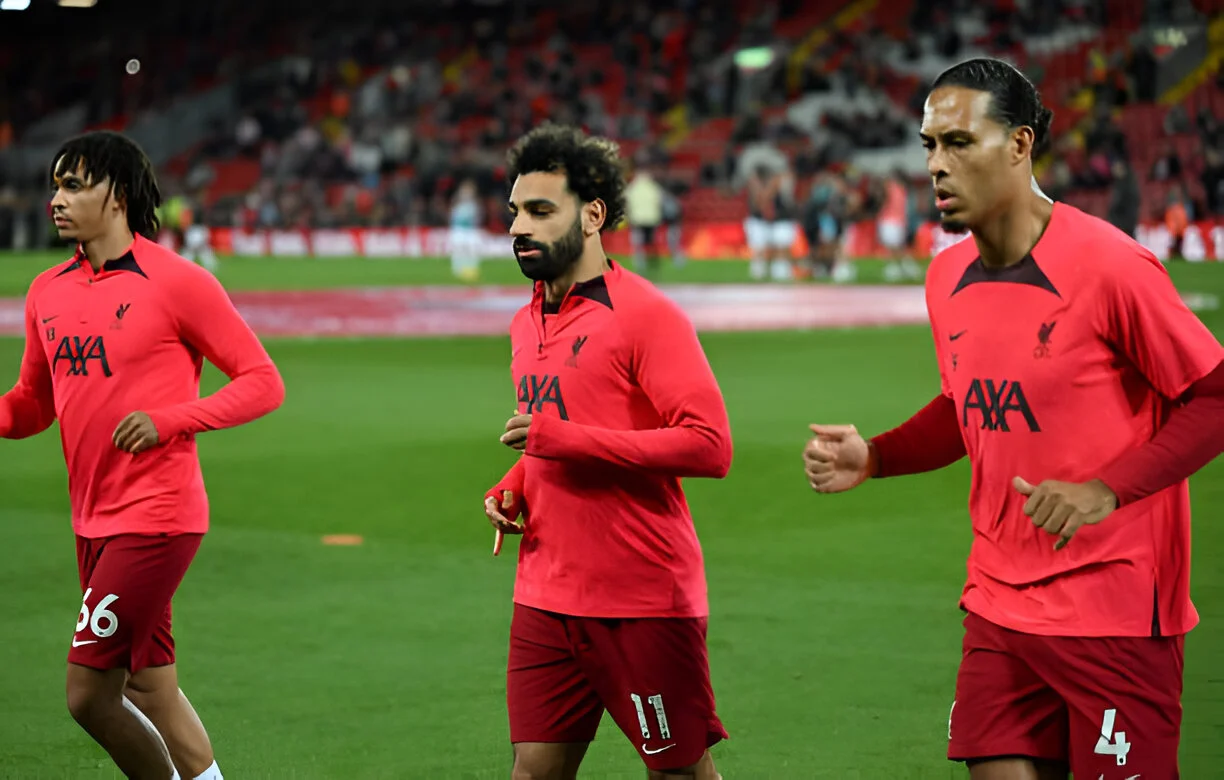Liverpool finds itself at a crossroads, grappling with a decision that could define the club’s future.
The contract situations of Virgil van Dijk, Mohamed Salah, and Trent Alexander-Arnold have become a lightning rod for debate among fans and pundits alike. Should Liverpool break the bank to keep their talismanic trio, or stick to Fenway Sports Group’s (FSG) disciplined “Moneyball” approach?
The Anfield faithful have made their stance clear. Emotional banners unfurled in recent games—calling for Salah to be paid what he deserves—highlight the growing frustration. “Stop exploiting loyalty,” read one message, pointing to fans’ discontent not just with player contracts but also with broader issues like ticket price hikes. These protests, however, underscore a deeper, more intricate dilemma.
Liverpool’s financial model has always been a balancing act. The club recorded £594 million in revenue last year but still posted a £9 million pre-tax loss. Salaries for players like Salah, reportedly earning £20 million annually, are among the highest in the league. Increasing the wage ceiling for their three stars, while renewing deals for younger players, would stretch Liverpool’s resources to breaking point.
The challenges facing FSG are compounded by inflationary pressures across the football industry. Ticket prices have risen by 873% since 1992, outpacing inflation by a staggering margin. Meanwhile, player wages across the Premier League have soared by over 2,800% since the league’s inception. In an environment where agents’ fees now total nearly £400 million annually, even giants like Liverpool face tough choices.
Salah and Van Dijk’s situations are especially complex. Both are in their 30s yet remain integral to Liverpool’s success. Salah has been nothing short of spectacular this season, while Van Dijk continues to marshal the defense with poise and authority. However, committing to long-term deals for players in this age bracket comes with inherent risks. Declines in performance, injuries, and the toll of grueling seasons could turn today’s assets into tomorrow’s liabilities.
Alexander-Arnold’s case, at 26, is different but no less significant. As a younger player in his prime, his value to Liverpool’s future is immense. Yet, persistent rumors of interest from abroad, coupled with Liverpool’s cautious wage strategy, create uncertainty around his long-term commitment to Anfield.
Advertisement
Latest Press Conference
We’re on Social Media



The financial pressures extend beyond player contracts. Match-day revenues, which brought in £80 million last season, cover only a fraction of the club’s “administrative costs,” which have ballooned to £562 million annually. Raising ticket prices further risks alienating a core fanbase already vocal about affordability concerns. Meanwhile, relying on broadcasting revenues and sponsorship deals has its limits, as other clubs backed by state-owned wealth continue to redefine spending norms.
For FSG, the decision is not just about numbers. It’s about identity. Liverpool’s success under Jürgen Klopp was built on a mix of shrewd recruitment, tactical brilliance, and financial discipline. Departing from that formula by overspending on aging players could jeopardize their ability to rebuild for the future. Yet, losing Salah, Van Dijk, or Alexander-Arnold in quick succession risks dismantling the spine of a team that has consistently challenged for top honors.
Fans argue that Liverpool must compete with rivals like Manchester City and Real Madrid, who show little restraint in securing their stars. But Liverpool’s owners have long resisted the allure of unsustainable spending, citing examples of past failures, such as Joe Cole’s costly contract in 2010, as cautionary tales.
Even as the contract impasse drags on, it’s hard to imagine Liverpool letting all three players walk away. Salah’s goal-scoring prowess, Van Dijk’s defensive leadership, and Alexander-Arnold’s playmaking ability are too valuable to lose without significant consequences. Their departures could leave gaping holes that even the most ambitious transfer plans might struggle to fill.
The situation demands compromise from all parties. Salah, Van Dijk, and Alexander-Arnold enjoy unparalleled adoration and influence at Liverpool, factors that might not be replicated elsewhere. For the club, retaining these stars sends a message of ambition to supporters and prospective recruits. However, overcommitting financially risks undermining Liverpool’s ability to remain competitive in the long term.
As the brinkmanship continues, fans are left hoping for resolutions that preserve the club’s identity while securing its immediate future. The 2025/26 season looms, and Liverpool’s decisions now will shape whether the team remains a powerhouse or enters a period of rebuilding.
Ultimately, this isn’t just a debate about contracts or finances. It’s about defining what Liverpool stands for in an era of escalating costs and widening gaps between the sport’s elite. Will the club uphold its disciplined ethos, or adapt to a new reality where keeping its stars means bending the rules it once held sacred? The answer may well determine the next chapter in Liverpool’s storied legacy.
